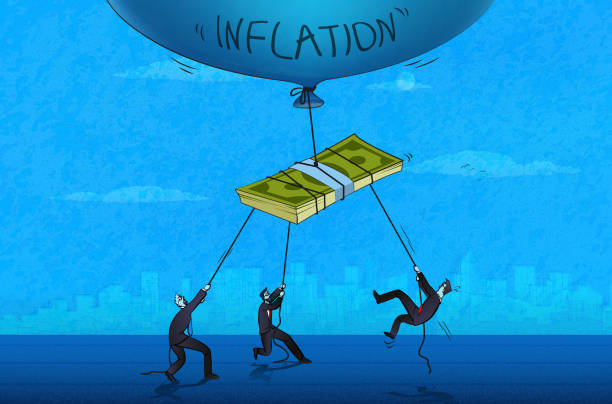Inflation is a crucial economic indicator that significantly impacts the stock market. It refers to the rise in the general price level of goods and services over a specific period. While moderate inflation can indicate a healthy economy, excessive or insufficient inflation can create challenges for investors and businesses alike. The relationship between inflation and the stock market is complex, as it can influence corporate profits, investor sentiment, and monetary policy.
What is Inflation?
Inflation is the rate at which prices for goods and services increase over time. It is typically measured by indices such as the Consumer Price Index (CPI) or the Producer Price Index (PPI). Central banks, like the Federal Reserve in the United States, aim to maintain inflation at a target rate—usually around 2%—to support economic stability.
The Stock Market and Inflation: A Double-Edged Sword
The inflation stock market relationship can be viewed from two perspectives:
- Moderate Inflation: When inflation is moderate and predictable, it can benefit the stock market. Companies may increase their prices to maintain profit margins, potentially boosting their earnings and stock prices. Moreover, it suggests robust consumer demand, which supports business growth.
- High Inflation: On the other hand, high inflation erodes purchasing power, increases production costs, and reduces corporate profitability. It also leads to tighter monetary policies, such as higher interest rates, which can weigh on the stock market.
The Role of Central Banks
Central banks, such as the Federal Reserve, play a pivotal role in the stock market relationship. They use monetary policies to manage inflation:
- Raising Interest Rates:
- Higher rates reduce spending and borrowing, cooling inflation but also slowing economic growth.
- This can lead to a decline in stock market performance, especially in interest-rate-sensitive sectors.
- Quantitative Tightening:
- Central banks may reduce the money supply by selling government securities, which can increase bond yields and make equities less attractive.
- Inflation Targeting:
- By maintaining inflation within a specific range, central banks aim to balance economic growth and market stability.
How Inflation Impacts Different Sectors
Inflation does not affect all sectors of the stock market equally.
- Commodity Stocks: Companies involved in commodities like oil, gold, and agriculture often benefit from inflation because the prices of their products tend to rise during inflationary periods.
- Consumer Staples: These include companies that produce essential goods. Their products are in demand regardless of economic conditions, making them relatively resilient to inflation.
- Technology and Growth Stocks: These sectors are more sensitive to rising interest rates, which are often implemented to combat inflation. Higher rates increase borrowing costs and reduce future earnings potential, impacting their stock prices.
Inflation’s Influence on Monetary Policy
Central banks play a vital role in managing inflation. When inflation is high, they may raise interest rates to cool down the economy. Conversely, during periods of low inflation or deflation, they may lower rates to encourage spending and investment.
The stock market connection is evident in how investors react to monetary policy changes. For example, rising interest rates can lead to a sell-off in the stock market as borrowing costs increase and future earnings are discounted more heavily.
Historical Perspective: Inflation and Stock Market Performance
Historically, the relationship between inflation and the stock market has shown varying patterns. During the 1970s, a period of stagflation (high inflation and low economic growth), the share market struggled due to diminished corporate profits and high interest rates. However, in the early 2000s, moderate inflation supported economic growth, which led to strong market performance.
Strategies for Investors During Inflation
Investors often seek to mitigate the impact of inflation on their portfolios. Here are some strategies:
- Diversification: A well-diversified portfolio across asset classes like stocks, bonds, real estate, and commodities can help offset inflation’s effects.
- Invest in Inflation-Resistant Assets: Sectors such as commodities, real estate, and consumer staples often perform well during inflationary periods.
- Focus on Value Stocks: Value stocks, which tend to trade at lower price-to-earnings ratios, may offer more stability in an inflationary environment compared to high-growth stocks.
- TIPS (Treasury Inflation-Protected Securities): These government bonds are designed to protect against inflation by adjusting their principal value based on CPI changes.
The Psychological Aspect of Inflation and the Stock Market
Investor sentiment plays a significant role in the inflation stock market relationship. Rising inflation can lead to uncertainty, causing market volatility as investors reassess the value of their holdings. Conversely, confidence in central banks’ ability to manage inflation can stabilize markets.
Future Outlook: Inflation and Stock Market Dynamics
As global economies recover from disruptions like the COVID-19 pandemic, inflationary pressures are likely to persist. Factors such as supply chain bottlenecks, labor shortages, and geopolitical tensions contribute to rising prices. Investors should monitor central bank policies and economic indicators to navigate the evolving landscape of the inflation stock market.
Conclusion
The interplay between inflation and the stock market is multifaceted, influenced by factors such as corporate earnings, sector performance, and monetary policies. While moderate inflation can support economic growth and stock market performance, high inflation poses risks by eroding purchasing power and increasing costs. Understanding the dynamics of the stock market relationship is essential for investors to make informed decisions and adapt to changing economic conditions. By employing strategies like diversification and focusing on inflation-resistant assets, investors can protect their portfolios and seize opportunities in an inflationary environment.

